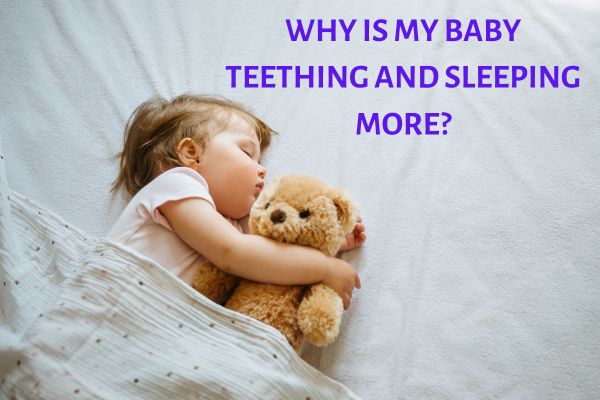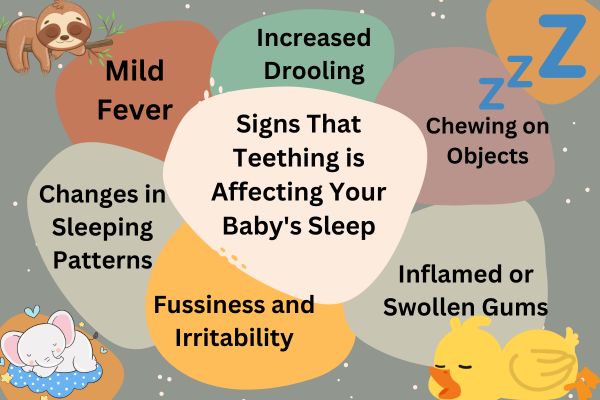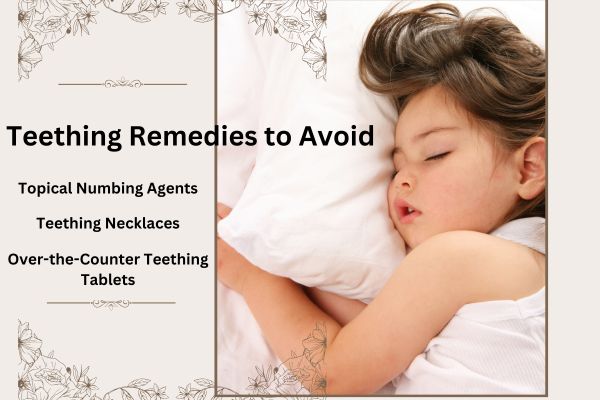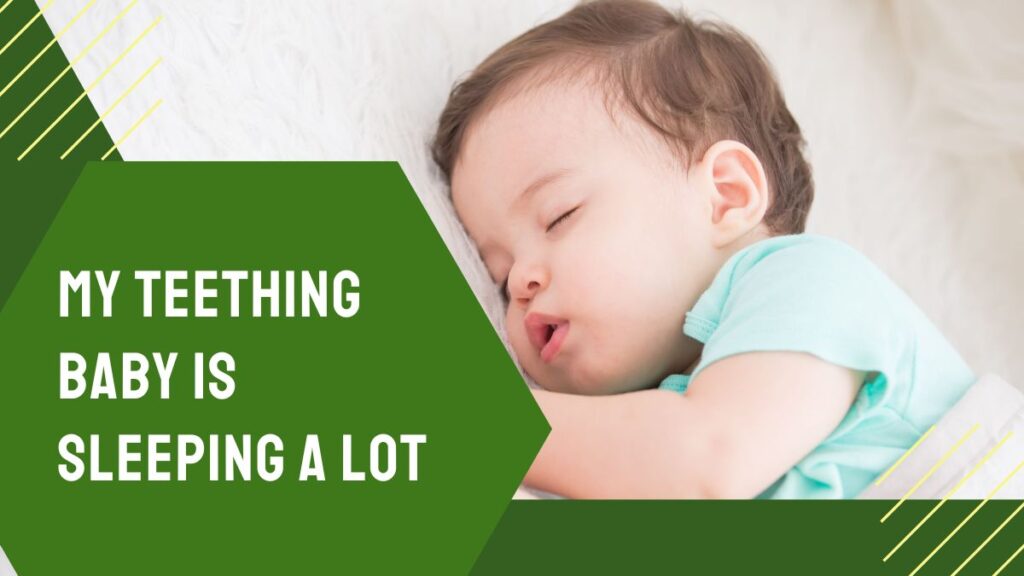You’re not alone if you’ve noticed that my teething baby is napping a lot. Many parents question whether this conduct is typical or cause for concern. Clarity and peace of mind can be gained by comprehending teething and how it impacts your baby’s sleep. In this comprehensive guide, we’ll go over the reasons why my teething baby is sleeping a lot, as well as warning signals and practical solutions to help you and your child get a better night’s sleep.
You may want to read: 4 year olds and temper tantrums
- Why Is My Baby Teething and Sleeping More?
- Signs That Teething is Affecting Your Baby's Sleep
- Important Note:
- How to Help a Teething Baby Sleep Better
- Teething Remedies to Avoid
- When Should You Be Concerned?
- Recommended Products for Teething Relief
- FAQs About my teething baby is sleeping a lot
- Final Thoughts on my teething baby is sleeping a lot
Why Is My Baby Teething and Sleeping More?

For both babies and parents, the teething process can be difficult. Some babies appear to sleep more than usual during teething, despite the fact that this is often associated with fussiness and disturbed sleep. Here’s why this could occur:
1. Growth Spurts and Teething Go Hand in Hand
During teething, your baby’s body is not just focused on new teeth but also experiencing growth spurts. Growth hormones are released during sleep, so it’s normal for babies to sleep extra during these periods.
2. Teething Fatigue
The discomfort of teething can tire your baby out, leading to longer naps or additional sleep. This is especially true if your little one is actively chewing or crying, which can exhaust them physically.
3. Energy Conservation
Babies need a lot of energy to grow, and teething can be a demanding process for their small bodies. By sleeping more, they conserve energy to deal with the pain and inflammation of emerging teeth.
Signs That Teething is Affecting Your Baby’s Sleep

For both parents and babies, the teething process may be both thrilling and difficult. You can give better attention and comfort if you can identify the early symptoms of teething. The most typical warning indicators are listed below:
1. Increased Drooling
If your baby suddenly starts drooling more than usual, it might be a sign that teething has begun. Keep a soft bib handy to prevent skin irritation caused by the constant moisture.
2. Chewing on Objects
Babies tend to chew on their fingers, toys, or any nearby objects when they’re teething. This helps relieve the pressure and discomfort in their gums.
3. Inflamed or Swollen Gums
Take a closer look at your baby’s gums. If they appear red, swollen, or tender, a tooth might be pushing its way through.
4. Fussiness and Irritability
Teething pain can make your baby more cranky or irritable, especially during naps or bedtime. They may also cry more frequently than usual.

5. Changes in Sleeping Patterns
Some parents notice that their teething baby is sleeping a lot, while others might experience frequent sleep disruptions. This inconsistency is due to discomfort and possible growth spurts.
6. Reduced Appetite
Your baby might refuse to eat or drink because sucking can cause more gum pain. Offering cold, soft foods like chilled applesauce can help.
7. Ear Tugging or Face Rubbing
Teething pain can radiate to other areas, like the ears or cheeks, causing your baby to pull at their ears or rub their face.
8. Rash on the Chin or Face
Excessive drooling can lead to a rash around the mouth or chin. Applying a gentle moisturizer can help soothe irritated skin.
9. Mild Fever
A slight increase in temperature might occur, though a high fever is not directly linked to teething and should be evaluated by a pediatrician.
10. Irritation During Playtime
If your baby seems less interested in playing and more focused on comforting their gums, it’s a telltale teething sign.
Important Note:
If your baby shows signs like high fever, diarrhea, or vomiting, these are likely unrelated to teething and could indicate an infection. Consult a pediatrician to rule out any serious issues.
By identifying these signs early, you can take proactive steps to soothe your baby during this teething phase.
How to Help a Teething Baby Sleep Better
When my baby is teething and sleeping a lot, it’s essential to ensure their comfort and safety. Follow these actionable steps:
1. Create a Calm Sleep Environment
- Use blackout curtains to reduce light.
- Turn on a white noise machine to mask household sounds.
- Keep the room temperature comfortable.
2. Offer a Safe Teething Relief

- Use a cold teething ring to numb the gums.
- Offer a frozen washcloth for your baby to chew on.
- Gently massage your baby’s gums with clean fingers.
3. Adjust Their Bedtime Routine
- Give them a soothing warm bath before bed.
- Read a calming story or sing a lullaby.
- Stick to a consistent bedtime schedule to help them feel secure.
4. Use Baby-Friendly Pain Relievers
If your baby is in significant discomfort, talk to your pediatrician about using baby-safe pain relief gels or acetaminophen. Always follow dosing instructions.
Teething Remedies to Avoid

While it’s tempting to try everything, some remedies should be avoided:
- Topical Numbing Agents: These can be unsafe for infants if swallowed.
- Teething Necklaces: They pose choking and strangulation risks.
- Over-the-Counter Teething Tablets: Some may contain harmful ingredients.
When Should You Be Concerned?
Although teething baby sleeping more is usually normal, contact your pediatrician if you notice:
- Prolonged fever above 101°F.
- Persistent diarrhea or vomiting.
- Lethargy beyond normal tiredness.
- Refusal to eat or drink for more than a day.
These symptoms might indicate an unrelated illness.
Recommended Products for Teething Relief
Help your baby get through teething comfortably with these products:
1. Silicone Teething Rings
Safe, BPA-free options that babies can chew on to ease gum discomfort.
2. Teething Mittens
Perfect for babies who constantly chew their hands.
3. Natural Teething Gel
Organic and baby-safe gels provide temporary relief without harmful chemicals.
4. Teething Necklaces (For Supervised Use Only)
Some parents swear by these, but always supervise use to avoid risks.
These products not only soothe your teething baby but also give you peace of mind during this phase.
FAQs About my teething baby is sleeping a lot
1. Is it normal for babies to sleep more during teething?
Yes, some babies sleep more to cope with the discomfort and conserve energy for growth.
2. Why is my baby teething and sleeping less?
Teething pain can disrupt sleep for many babies. Try soothing their gums and creating a relaxing bedtime routine.
3. How long does teething last?
Teething occurs intermittently from around 6 months to 2.5 years old, with each tooth causing discomfort for about a week.
4. Should I wake my baby if they’re sleeping too much while teething?
No, let your baby sleep as long as they’re eating and drinking normally. Their body needs rest to recover and grow.
5. What can I do if teething remedies don’t work?
If home remedies fail, consult your pediatrician for advice on safe medications or further evaluations.
Final Thoughts on my teething baby is sleeping a lot
Teething is a natural but challenging phase in your baby’s development. If my teething baby is sleeping a lot, it’s typically a sign their body is working hard to grow. By recognizing the signs, offering comfort, and using the right products, you can make this process easier for both you and your baby.
Don’t forget—every baby is unique. Observe your child closely and adapt these tips to suit their individual needs. With patience and care, you’ll both get through this teething phase together!





